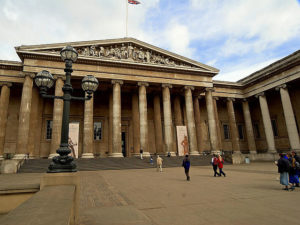The British Museum is a behemoth so extensive and unwieldy that it is often the last to conform to changes made long ago by comparable museums. They are noticeably behind the curve regarding issues like repatriation and NFTs. However, they finally got on board with one major point activists have been demanding for years. After 27 years of partnership, the British Museum has finally cut ties with British Petroleum.
BP was a major sponsor of the British Museum via a five-year contract that ended in February, and neither organization has announced any plans of renewing or renegotiating a similar contract. Many have pointed out that while this is promising, it is not definite. One museum source confirmed that “there are no other contracts or agreements in effect between the museum and BP”. Climate activists are still calling for the British Museum or BP to make an official announcement about the partnership’s future. If the British Museum does decide not to continue its relationship with BP, not only will it lose the company’s money, but it will have to remove BP’s name from galleries, theaters, and other spaces it operates. If such an announcement comes, environmental activists will probably lighten up on the British Museum just a little, focusing on some museums that still maintain ties with petroleum companies, like the London Science Museum.
One by one, British arts organizations have been cutting their ties with BP: In 2016, it was the Tate galleries, then the National Galleries of Scotland in 2019. In February 2022, London’s National Portrait Gallery made headlines when it cut ties with BP after nearly 30 years. Most recently, the Royal Opera House in Covent Garden ended its BP sponsorship, leaving the British Museum as the only major British cultural institution to maintain ties with the petroleum giant. The British Museum has taken some steps, however lackluster, to support environmental causes. In December 2022, the museum administration announced its plans to become net carbon zero by refurbishing the original museum building built in the 1830s. The museum administration has previously defended accepting money from BP, saying it was a financial necessity. However, with environmental protesters taking more direct action and posing more of a danger to the museum’s collections, perhaps the board of trustees is shifting their priorities slightly. Ahdaf Soueif is a British-Egyptian novelist who served on the museum’s Board of Trustees until resigning in protest in 2019 over the museum’s continued partnership with oil and gas companies. In light of the British Museum’s latest decision, she said that petroleum companies use cultural institutions “to look like a force for good in society; denying them this platform is important.”

